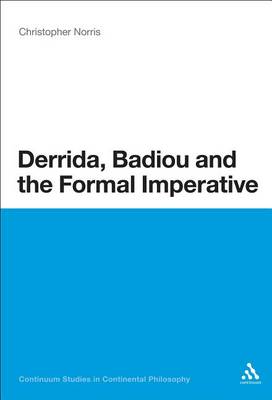Continuum Studies in Continental Philosophy
1 total work
In this path-breaking study Christopher Norris
proposes a transformed understanding of the much-exaggerated differences
between analytic and continental philosophy. While keeping the analytic
tradition squarely in view his book focuses on the work of Jacques Derrida and
Alain Badiou, two of the most original and significant figures in the recent history
of ideas.
Norris argues that these thinkers have decisively
reconfigured the terrain of contemporary philosophy and, between them, pointed
a way beyond some of those seemingly intractable issues that have polarised
debate on both sides of the notional rift between the analytic and continental
traditions. In particular his book sets out to show - against the received
analytic wisdom - that continental philosophy has its own analytic resources
and is capable of bringing some much-needed fresh insight to bear on problems
in philosophy of language, logic and mathematics. Norris provides not only a
unique comparative account of Derrida's and Badiou's work but also a remarkably
wide-ranging assessment of their joint contribution to philosophy's current -
if widely resisted - potential for self-transformation.
proposes a transformed understanding of the much-exaggerated differences
between analytic and continental philosophy. While keeping the analytic
tradition squarely in view his book focuses on the work of Jacques Derrida and
Alain Badiou, two of the most original and significant figures in the recent history
of ideas.
Norris argues that these thinkers have decisively
reconfigured the terrain of contemporary philosophy and, between them, pointed
a way beyond some of those seemingly intractable issues that have polarised
debate on both sides of the notional rift between the analytic and continental
traditions. In particular his book sets out to show - against the received
analytic wisdom - that continental philosophy has its own analytic resources
and is capable of bringing some much-needed fresh insight to bear on problems
in philosophy of language, logic and mathematics. Norris provides not only a
unique comparative account of Derrida's and Badiou's work but also a remarkably
wide-ranging assessment of their joint contribution to philosophy's current -
if widely resisted - potential for self-transformation.
